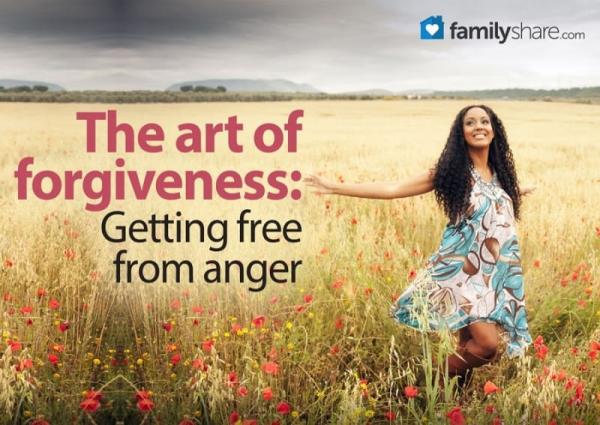
Resentment is one of the most damaging of human emotions. The perception of feeling wronged or betrayed can quickly harden into bitterness if we don't make the effort to learn to grow past the fault we were dealt. Sometimes it may feel as though holding on to anger empowers us, or that if we forgive then we are approving of the action that hurt us so deeply. But you may be familiar with the cliché, "Holding on to bitterness is like drinking poison and expecting the other person to die."
Still, suggestions to simply forgive and forget can feel flippant when we attempt to apply them to deep betrayals. Forgiveness is a deeper call to the spirit. It is the act of forgiveness that allows us to extract the beauty that is hidden within painful circumstances. Choosing to "just forget about it," or to "let it go," without processing its purpose can lead to a pushing down of your anger, which may resurface later in a much less controlled fashion.
After a particularly nasty betrayal in my own life a few years ago, I found myself in a place of being tired of anger and wanting very much to forgive. However, the ramifications of the hurt seemed to infiltrate even the tiniest areas of my life. Everytime saw evidence of this betrayal, anger or sadness would would encompass me.
I began to study forgiveness, across multiple religions and faiths, and learned quickly that my meager efforts to "forget" were not at all the same as forgiving. Forgiveness is a job, but it is worth every effort. Through practice, I have learned that those who hurt me give me a beautiful opportunity to grow in my faith and in my belief in goodness, when I am willing to forgive.
Below are some ideas to consider as you begin the journey of forgiveness in your own situation.
Awareness of being forgiven
Being harmed, particularly if it was unprovoked, can often lead us to a place of self-righteous anger. However, being wronged makes us quick to forget that we ourselves have also harmed others at some point. Perhaps not to the same degree or in the same manner, but at one time or another we have surely inflicted pain on someone we love. Take some time to meditate on the forgiveness you have been afforded in your relationships.
My spiritual beliefs offer me forgiveness for every aspect of my flawed humanity, and when I take pause to consider how enormous that grace is, how I am forgiven so that I may grow into a more loving person, it makes it difficult to hold on to hatred toward someone who has harmed me.
Ignorance in the person who has harmed you
Most people hurt others because they themselves are hurting in some way. Fear permeates the lives of the hurting, and it can blind them to the real effects of their actions. My spiritual discipline calls this "spiritual sickness." It helps, because it reminds me that even though it may feel personal, the harmful act was a result of the perpetrator's own internal struggles. Just as we may be less likely to resent someone who is bedridden with cancer, so might we be more inclined to forgive a person whose spiritual illness has affected us negatively.
Harmful effects of bitterness on your spirit
Betrayals have the power to bring us to our knees if we allow our anger to settle within us. Once we give resentment the permission to take up residency in our hearts, it has a magnetic effect that pulls negativity toward us. Before long there is a sense that we are victims whenever we are hurt in life, and the weight of bitterness robs us of peace, happiness and love. On the other hand, meditating on forgiveness is freeing. It enables you to not be held in a prison by the person who has harmed you, but rather to gently accept that although their actions were wrong, you are able to heal from the pain and move on as a stronger, more loving person. Allow their consequences to come from their own journey, as vengeance is not yours, unless you want it to consume your whole life.
Belief in the necessary aspects of pain in your journey
Not all of our lessons in life are easy to swallow. If we are to grow spiritually, there will be lessons along the way that hurt deeply. It catches our attention so that we can make the choice to either learn from it or continue to be harmed by it. If we view the person who harmed us as a vessel who delivers us an opportunity to grow, it opens our hearts up to begin to be grateful for their presence in our lives. Again, it doesn't mean that we approve of their behavior; it means that we are able to see that the greater good is at work.
Prayer
All of these concepts are great ideas as we strive toward practicing forgiveness, but nothing is more powerful than plugging into divine help. Prayer allows us to reach out in faith and become conscious that we are not alone in the seemingly cumbersome task of forgiveness. Offering daily prayer for the healing, prosperity and joy of the person who offended you will go a long way in helping to give you empathy for their own experiences. Requests for strength, the ability to forgive, and your own peace and healing will infuse your soul with a fortitude that you may not have thought possible.
Now is the time to start to enjoy the freedom of forgiveness. Old resentments can melt away and you can learn how to prevent new ones from keeping you in bondage. It is a wonderful feeling to be fully alive in this present moment, unshackled by the wrongs of the past.

